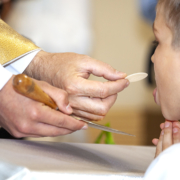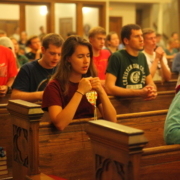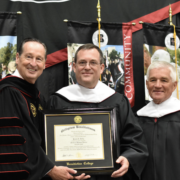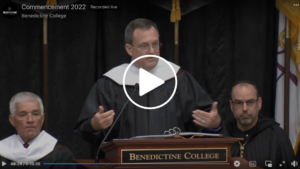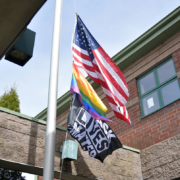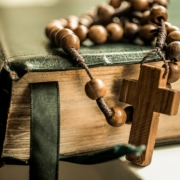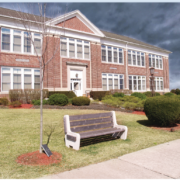College-Bound? Try These Catholic Summer Programs
What better way for a high school student to spend a week or two this summer, than to enjoy a fun and spiritual program at a Catholic college!
A faithful Catholic education can prepare students not only for a career, but for life. Whether or not you plan to attend a Catholic college, a summer program at one of the faithful colleges recognized in The Newman Guide can be enriching and will give you a taste of the benefits of a Catholic education.
Summer programs are a great opportunity for high school students to strengthen their academic and extracurricular skills, grow in their spiritual lives, get a head-start on college visits, learn from distinguished professors, make lifelong friends and experience what faithful Catholic education is all about. Here are some options:
Ave Maria University in Ave Maria, Fla., is offering its 2nd annual Summer Leadership Program for rising high school juniors and seniors. “Called Higher,” which runs from July 24-30, is geared towards students “who are academically driven and committed to growing in their faith through the pursuit of higher education.” Participants will get an idea of AMU culture by touring the campus, attending classes and meeting faculty while also getting to explore southwest Florida.
Belmont Abbey College’s Schola program in Belmont, N.C., strives to cultivate a true life of leisure over a one-week session which runs July 16-22. According to the College, students are invited “to slow down, to spend a summer week cultivating the goodness of their souls by reading and discussing classic works of philosophy and literature with friends, having meaningful conversations about the fundamental questions of life, enjoying daily recreational and social activities, viewing films, contemplating beautiful works of art and spending time in prayer and worship with the monastic community of Belmont Abbey.” Videos on the Schola program webpage show some of the highlights of previous years.
The Benedictine College Youth Conferences (BCYC) Immersion program in Atchison, Kan., offers three sessions for students to choose from over 20 “tracks” including, but not limited to, computer science, engineering, nursing, faith and science, philosophy, graphic design, voice and art. Outside of class, students participate in Bible studies, attend Mass and engage in a variety of social activities from dances to sports to scavenger hunts. Participants report that they come away from the week refreshed and inspired. Benedictine also offers a one-week session for “BCYC Leadership,” which will help students discover how Catholic leadership principles can transform the way they lead at school, in their parish and in their community. There is also a BCYC Encounter conference, led by current Benedictine students, for parish and diocesan groups that focuses on Benedictine spirituality. Finally, Benedictine is inviting rising high school juniors, seniors and graduated seniors to earn three hours of college credit while studying abroad on a “Journey with Dante,” a three-week trip in Italy.
The Catholic University of America in Washington, D.C., offers a wide variety of summer educational experiences with weeklong summer programs focused on architecture, performing arts, the sciences and theology, providing opportunities to rising juniors and seniors for an exciting educational experience in the nation’s Capital. Light the World! Summer Institute lets high school students witness faithful excellence in action in business, science, politics, sports and the arts while meeting professionals who live out their faith in everyday life. The Experiences in Architecture program is an intense two- or three-week, pre-college workshop that exposes students to both the academic and professional sides of the architectural arena, with the capital city as their classroom. Catholic University’s High School Drama Institute is a program for students who wish to study voice, movement and acting with experts in the field. For students interested in the field of Engineering, CUA offers two different summer programs, Engineering New Frontiers and Computational Biosciences Institute. These weeklong programs expose students to many of the engineering disciplines, including biomedical, mechanical, electrical, civil and computer science.
Christendom College in Front Royal, Va., is offering “The Best Week Ever,” a choice of five different one-week sessions throughout June and July. Intended for rising high school seniors, the program instills in students “a deep appreciation for the liberal arts, Catholic culture, true friendship, and the beauty of God’s creation evidenced in the Shenandoah Valley of Virginia.” Participants attend daily classes in literature, philosophy, history and theology; hike in the mountains; canoe on the Shenandoah River; sing Irish songs; learn to swing dance and forge new friendships. As one student said afterward, “When I first heard about it, I honestly thought the ‘Best Week Ever’ was just an advertisement, but I truly did have the best week of my life and I have made memories I will treasure forever. Not only did I learn so much during my short time at Christendom this summer, but I’ve met the most amazing people and made friends I am still keeping up with. In learning so much about Christendom College and meeting such dedicated Catholics, I grew much closer to Christ and left the program with a desire to continue growing my relationship with God.”
Franciscan University’s summer Steubenville Conferences are popular with Catholic high school students across the country. The three-day Catholic conferences bring teens into a life-changing encounter with Jesus Christ. Conferences take place at multiple locations across the United States and Canada, including four conferences at Franciscan University’s campus in Steubenville, Ohio. The theme for the 2023 conferences is “Refuge” (Matthew 11:28 ). Dynamic speakers this summer include Sarah Swafford, Joel Stepanek, Fr. Leo Patalinghug, Mark Hart, Sr. Miriam James Heidland, SOLT, and many more. Interested students must apply to attend a conference through a parish, high school or youth ministry group.
High school students and recent graduates are invited to preview the academic community and life of Magdalen College of the Liberal Arts in Warner, N.H., through its Collegiate Summer Program, being held June 18 to July 1 and July 9-22. Students are taught by Magdalen College professors each day and are introduced to liberal education through classic texts from philosophy, literature, theology and political thought. Outside of the classroom, program participants attend daily Mass, climb Mount Kearsarge, canoe on a river, relax around bonfires, swing dance, visit local landmarks and much more.
Once again, Thomas Aquinas College is offering its Great Books summer program in two locations: its campus in Santa Paula, Calif., from July 16-29, and its second campus in Northfield, Mass., from July 9-22. These two-week programs engage students in seminars on Plato, Pascal, St. Thomas Aquinas and Kierkegaard, among others. In addition to daily recreational and liturgical activities, the program also includes day trips to nearby cities. A detailed day-to-day picture of what the Great Books program is like can be found on the college’s blog. This program is offered to rising seniors.
Thomas More College in Merrimack, N.H., offers a Great Books program for high school-aged students. This two-week session, offered June 25 to July 8 and July 16-29, will inculcate its participants in a “healthy balance of prayer, work and play” as they read authors like St. Thomas More, Plato, Aristotle and George Orwell. Along with academics, students will go on excursions throughout New England, including hiking mountains, visiting historic locations and visiting the coast.
The University of Dallas in Irving, Tex., offers several summer programs for high schoolers interested in classical texts, art and music. Rising juniors and seniors can experience life on campus during the two-week Arete: An Introduction to the Classics. Students as young as rising seventh graders can attend the Summer Art Academy or the Summer Music Academy to enhance their artistic potential. Both of these programs run for one week.
The University of Mary in Bismarck, N.D., offers a summer program for high school students. The Cor Christi Institute program runs for two sessions in July on the University’s campus. This program invites high school students of all grades to encounter Jesus and learn the foundational teachings and practices of the Catholic faith through serious study, good conversation and wholesome friendship.
The University of St. Thomas in Houston, Tex., is hosting a Young Diplomats and Global Affairs summer camp for rising 10th, 11th and 12th grade students from June 12-16, which will include a student-led diplomacy situation exercise modeled on the Diplomacy Center of the United States. That same week, the University’s master of Fine Arts in Creative Writing program is sponsoring a Fearless Catholic Writers camp in which students will learn from published authors.
For those rising seniors with adventurous spirits and a love for the outdoors, Wyoming Catholic College’s PEAK program in Lander, Wyo., offers a unique experience. Running from August 1-12, students are given the opportunity to study the Great Books under the instruction of WCC faculty and to immerse themselves in the sacraments. Students are also engaged in a variety of outdoor activities, tailored to the experience and fitness of each participant, including horseback riding, canoeing and caring for livestock.
For students interested in traveling abroad, the University of Navarra offers Spanish Intensive Summer Courses at its language institute on campus, Instituto Lengua y Cultura Española, ILCE. ILCE is offered in-person, so students get to enjoy all the campus has to offer. ILCE will also offer three on-campus courses between June and July on their campuses in Pamplona and Madrid. Students taking these courses can earn college credit and will also have the opportunity to participate in cultural activities outside of class.

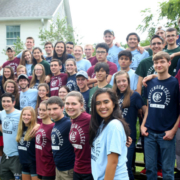

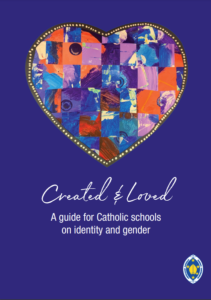
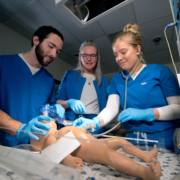
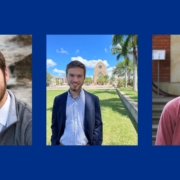
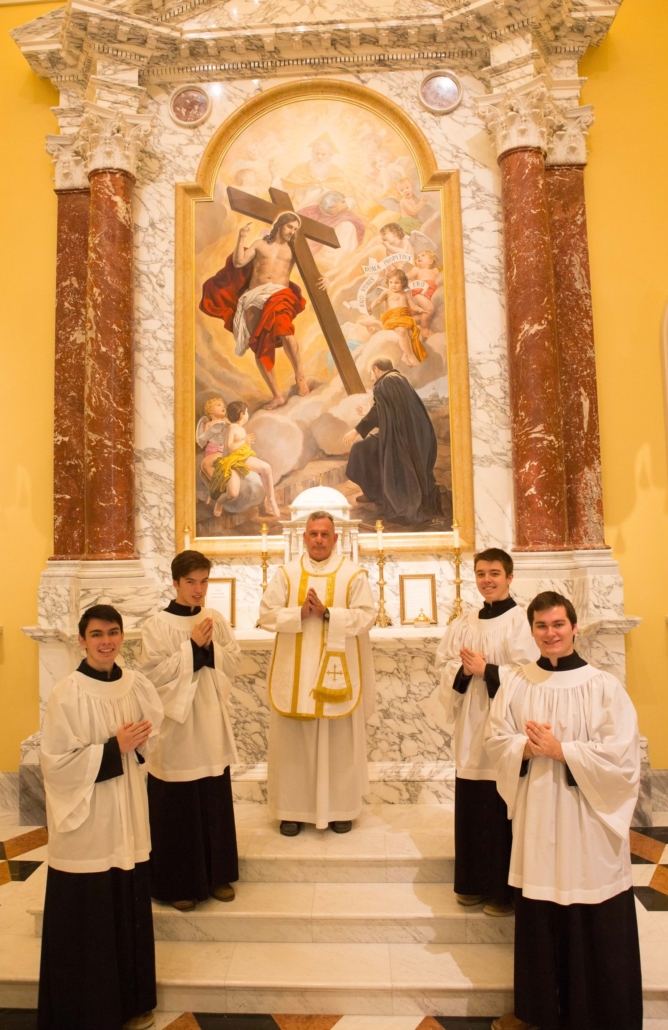 The Bellarmine Fund’s founders recall their wonderful experience of Catholic education at Jesuit High School in Tampa, Fla.
The Bellarmine Fund’s founders recall their wonderful experience of Catholic education at Jesuit High School in Tampa, Fla.